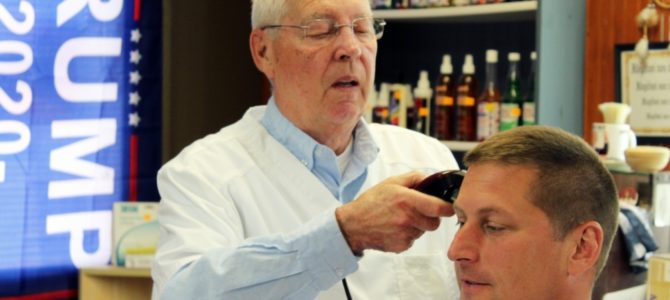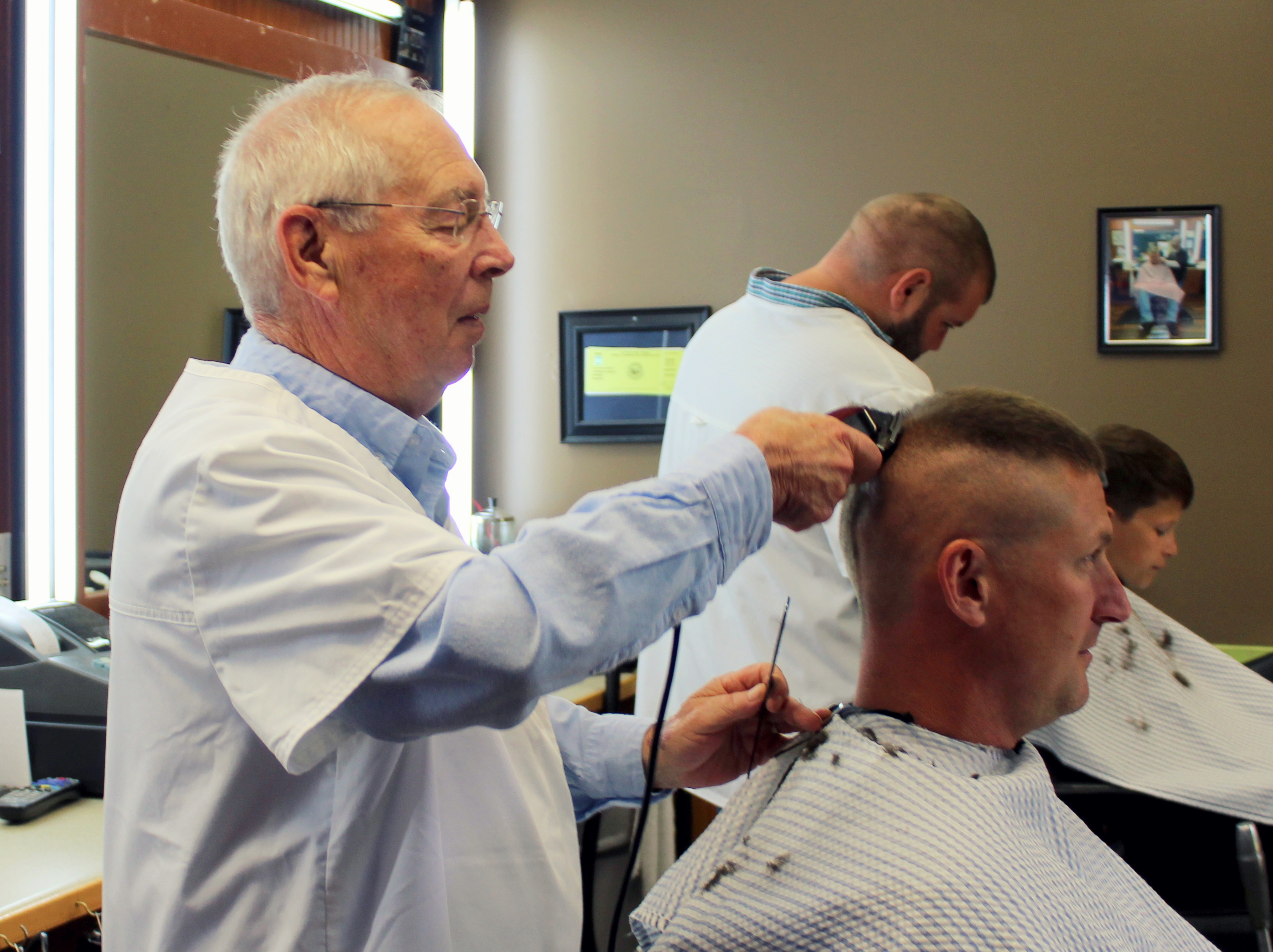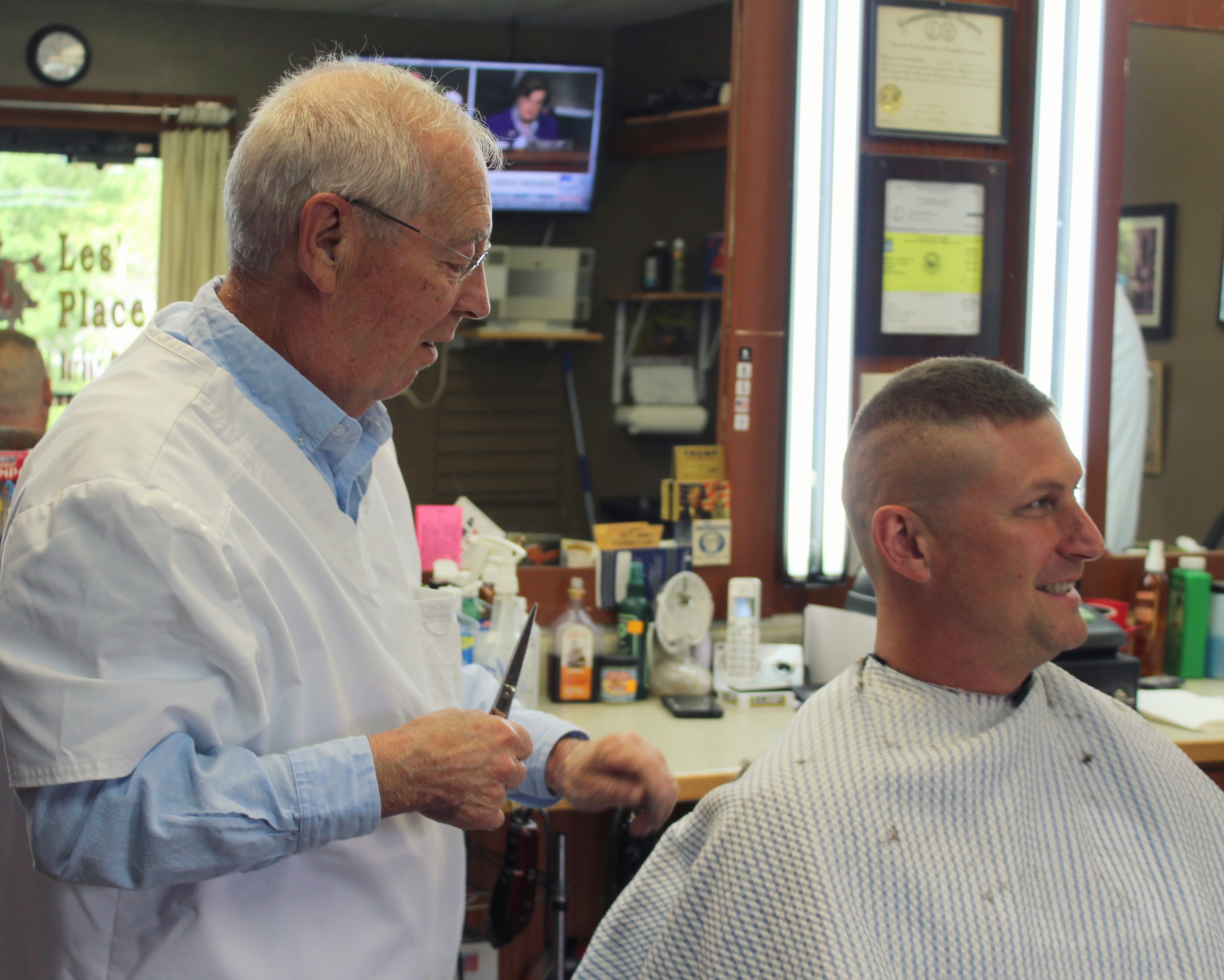
When Winerd “Les” Jenkins first became a barber, Neil Armstrong hadn’t yet set foot on the moon. For over five decades, Jenkins has made a living with his scissors and razor. For the past decade, he’s worked his craft from a storefront in Inwood, West Virginia. At Les’ Place Traditional Barber Shop, you can get a regular men’s haircut for $16 and a shave for $14—but come prepared to pay the old-fashioned way: in cash.
His insistence on “cash only” isn’t the only thing that’s old-school about Jenkins. He lives with his wife of 52 years on a small farm, where the couple raises rescued animals. He believes in paying his bills on time. He doesn’t use the internet, email, or text messaging. And he’s skeptical that his profession can become illegal overnight merely on the governor’s say-so.
This combination of old-fashioned values led to the soft-spoken barber’s arrest this spring. His story shows how governments’ uncoordinated coronavirus response has caught working Americans in its crossfire—and how the apparatus of occupational licensing has functioned as the state’s enforcement mechanism to shut down small business.
Denied Unemployment Assistance
When Les Jenkins first heard about the Wuhan coronavirus, his first concern wasn’t for his own livelihood but that of his wife, Sue. She is medically fragile, on oxygen after an illness left her with Chronic obstructive pulmonary disease (COPD) several years ago. “I thought long and hard about whether I should risk taking the virus home to her,” Jenkins told me. “But this is my only real source of income.”
Even before the state of West Virginia began issuing mandates to contain the virus, Jenkins was already putting his own protection measures in place for Sue’s sake. He wore a mask and gloves, sanitized tools and surfaces, and changed clothes upon coming home every evening.
On March 19, West Virginia Gov. Jim Justice ordered all hair salons and barbershops to close. Most salon owners got the message through the media. The West Virginia Board of Barbers and Cosmetologists (WVBBC) published guidelines on its website but didn’t proactively contact its license-holders.
“The West Virginia Board of Barbers never sent me any written instructions, never called, never sent an inspector to tell me to close,” Jenkins said. “The fellow who works with me saw it on the internet and told me about it.”
Jenkins initially complied with the order, using the time off to make renovations to his store. “After about three weeks, money started getting pretty tight,” Jenkins told me. At his local bank, he was turned down for a Paycheck Protection Program loan, due to operating an all-cash business. He called Workforce West Virginia to apply for pandemic-related unemployment assistance. “The unemployment office told me that in order to get assistance, I had to provide evidence that I’d been ordered to close.”
On April 10, to get the documentation needed for unemployment, Jenkins wrote to the WVBBC, requesting a signed letter to confirm the governor’s closure order. He never received a reply.
Reported to the State
By the time two more weeks had gone by with no income, Jenkins was in real fear of losing his home, farm, and business. “I’m 72 years old,” he told me. “What else am I going to do if not this? Who’s going to hire me?”
On Wednesday, April 22, Jenkins quietly opened his shop and cut hair for seven customers—all walk-ins, including several police officers. It would be his only day in operation. The next morning a WVBBC inspector came to the door. “I’ve known her for years, and we talked for a little while about her family,” Jenkins said. “Everything was cordial.”
The inspector told Jenkins the WVBBC had received a complaint the prior week from another local hairstylist, contending that Jenkins was open for business during the shutdown. Jenkins denied seeing customers at the time of the complaint—he was in his shop making renovations—but he admitted to being open the previous day.
He told the WVBBC inspector that he would be willing to close his shop if she would provide him with a copy of the governor’s closure order, signed for verification. The inspector returned to her car. “I assumed she was going to get the letter I had asked for,” Jenkins recalls. Instead, she was calling the sheriff. Two deputies promptly arrived.

After some back-and-forth between the sheriff’s deputies, the state inspector, and the barber, things came to an impasse. “Mr. Jenkins stated that so long as [the inspector] provided him with a copy of the governor’s order with her signature, in writing, he would agree to close his shop,” the sheriff’s deputy wrote in his arrest report. Although the inspector did print a copy of the governor’s order, she refused to sign it, saying that “she was instructed not to provide her signature on the documentation.”
After noting that Jenkins didn’t believe an unsigned document was sufficient, the deputy concluded: “Mr. Jenkins then asked if he may lock up his shop before being placed under arrest, and this deputy allowed him to do so.” Jenkins told me that “no one involved raised their voice or said anything detrimental. Everyone was cordial, professional, and polite.” Nothing in the officer’s report contradicts this characterization.
Jenkins spent three hours in a holding cell before being charged with obstructing an officer and released on a $500 recognizance bond. The misdemeanor charge carries a possible sentence of $50-$500 in fines, and up to a year in jail. Jenkins also worries about potential punitive actions from the WVBBC, which could include fines, suspension, or revocation of his license.
“They’ve Got the Power Over Me”
Today, Jenkins is working again, making up for lost time after six weeks without an income. He never did succeed in obtaining any government financial assistance. “I don’t know if I would have qualified for unemployment,” he told me. “But they wouldn’t even give me the opportunity to try. One bureaucracy dealing with another doesn’t work.”
It’s unclear why the unemployment office told Jenkins he needed to prove he’d been ordered to close his business. Workforce West Virginia did not respond to a request for comment. However, in interviews, other self-employed West Virginians attested to a disorganized, confused, and delayed response in receiving pandemic-related unemployment assistance. The Workforce West Virginia website currently contains a notice that its “systems are experiencing intermittent disruptions and temporary outages” due to overwhelming demand.
It’s still less clear why the state licensing board was unwilling to issue a signed letter at Jenkins’ request. The WVBBC proved far more interested in catching Jenkins breaking the governor’s order than it was in helping him abide by it. Rather than simply provide a document to help one of its barbers obtain assistance from another state agency, the bureaucrats at the WVBBC preferred to see the 72-year-old business owner leave his shop in the back of a police car.

The WVBBC—which did not respond to multiple requests for comment—is just one of an entrenched network of state occupational licensing boards in West Virginia. Last year, the Cardinal Institute for West Virginia Policy released a study comparing the state to two of its wealthier neighbors, Ohio and Pennsylvania. Not only does West Virginia have the most licensing boards of the three, but it also has generally higher fees and more onerous licensing requirements.
Garrett Ballengee, executive director of the Cardinal Institute, doesn’t believe an entity like the WVBBC even needs to exist. He notes that while approximately 5 percent of occupations required licenses in the 1950s, today that number stands at higher than 25 percent. “It’s a protectionist racket,” he says. “If we’re going to have an entity like this for barbers and hairdressers, it should provide voluntary certification or consultative services. It certainly shouldn’t be an extension of the legal system, which it clearly is.”
Indeed, in many states, occupational licensing boards have been a key enforcement mechanism for governors’ shutdowns of small businesses. For instance, Michigan’s own shutdown-defying barber has already had his license suspended. Fortunately, under the direction of President Trump, the federal government has been working to relax the regulatory burden on businesses and restart the national economy. State governments should follow this lead. The last thing small business owners need is to be worried about heavy-handed bureaucrats looking to set examples.
As for Jenkins, he has now hired an attorney from his own pocket, helped out by a few donations from the community. “I don’t want to go to jail for a year,” he told me. “I don’t want to lose my barber license. They’ve got the power over me; they’ve got lawyers funded by the state. I never set out to make a statement or a stand. I just wanted to pay my bills.”









